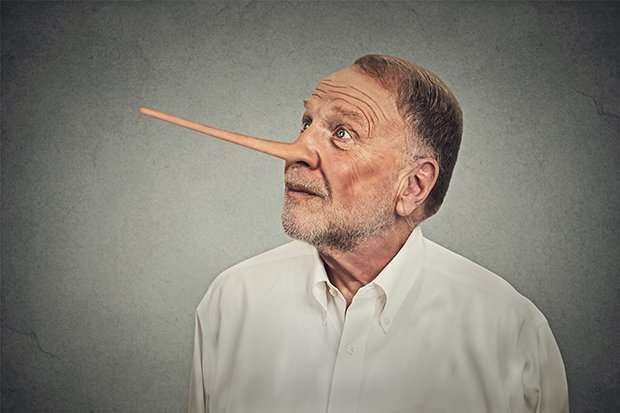Older people can come to believe their own lies
New research shows that within an hour of telling a falsehood, seniors may think it's the truth.
What happens when older adults lie?A new study suggests that in as little as 45 minutes they can come to believe it's the truth.Associate professor of psychology Angela Gutchess and her colleagues published the research online in the journal Brain and Cognitio n.Gutchess and her collaborators used electroencephalography (EEG) to monitor the brain activity of younger and older adults while they answered a questionnaire truthfully and deceptively.In the study, the older cohort, ages 60-92, proved significantly more likely than the 18-24-year-olds to accept as the truth a lie they had told less than an hour earlier."Older adults have more difficulty distinguishing between what's real and not real," said Laura Paige, a former graduate student in the Gutchess lab and the paper's first author.Paige said her findings suggest that telling a falsehood scrambles older people’s memory so they have a harder time recalling what really happened, in effect giving greater credence to the lie."Once they've committed to a lie, it's going to alter whether they remember doing something," said Paige, who now works forn Applied Marketing Science , a market research and consulting firm in Waltham, Massachusetts.In the study, 42 participants, about half seniors and half millennials, were given a form with 102 questions about what they did the previous day. The form asked them to respond to questions such as “Did you press snooze on your alarm clock?” and “Did you use a fork to eat lunch?”On half the questions, chosen at random, the researchers told the subjects to lie.Forty-five minutes later, the respondents answered the same questionnaire. This time they were told to answer all the questions truthfully.The central research question was: Did the lie stick? When the participants lied on a question the first time, did they remember they had lied or did they now think the lie was the truth?The results showed that compared to the younger group, older adults were more inclined to believe the lie.In addition, the EEG data revealed that lying engaged the brain processes responsible for working memory. According to Paige, this finding suggests a lie can embed itself in memory and come to feel as real as the truth."Lying alters memory," she said. "It creates a new memory for something that didn't happen." Eric Fields , a joint-postdoctoral fellow at Brandeis and Boston College, was the third author.

cocoabeach on November 30th, 2018 at 15:31 UTC »
Does this study control for the fact that older people have a hard time remembering what they have done in the resent past?
If you really can't remember what you did yesterday to any certainty, the recent lie might be just enough in your memory to sway your answer the other way.
I'm 63 and I believe that happens to me.
On the other hand I somehow believe this just happens to those other old people and somehow I am amune. I forgot what that syndrome is called.
o1d0r on November 30th, 2018 at 14:42 UTC »
Currently wondering if younger people showing symptoms of declining cognitive control could show similar results. Testing for cognitive control and determining a spectrum that may correlate to subjects abilities might be worth looking into for all ages.
mvea on November 30th, 2018 at 11:24 UTC »
The title of the post is a copy and paste from the title, subtitle and seventh paragraph of the linked academic press release here:
Journal Reference:
Laura E. Paige, Eric C. Fields, Angela Gutchess, Influence of age on the effects of lying on memory,
Brain and Cognition, 2018, ISSN 0278-2626,
Doi: https://doi.org/10.1016/j.bandc.2018.10.002.
Link: http://www.sciencedirect.com/science/article/pii/S0278262618301726
Highlights
• Lying requires cognitive control, which may impair memory at later test.
• Participants lied about completing actions while EEG data were collected.
• Older adults had reduced correct memory for items to which they lied.
• Frontal negativity emerged prior to response, greater for lie than truth responses.
• Results suggest neural activation is associated with working memory.
Abstract:
False memories are elicited from exposure to misleading information. It is possible that self-provided misinformation, or lying, has similar effects. We hypothesized that lying impairs memory for younger adults, as increased cognitive control, necessary to inhibit a truthful response, comes at the expense of retaining veridical information in memory. Because older adults show deficits in cognitive control, we hypothesized their memory is unaffected by lying. In the present study, participants made truthful and deceptive responses on a computer while EEG data were recorded. We investigated medial frontal negativity (MFN), an ERP component associated with deception and cognitive control, which may be differentially generated across age groups due to differences in cognitive control. Unexpectedly, results revealed that older adults showed reduced accurate memory for items to which they previously lied compared to younger adults. There were no age differences in correct memory for truth items. We did not find the expected MFN effect, however results revealed long-lasting negative slow waves (NSW) to lie items across age in the pre-response period and following the response cue, suggesting the role of working memory processes in deception. These findings demonstrate that lying is another source of misinformation and influences memory differently across the lifespan.